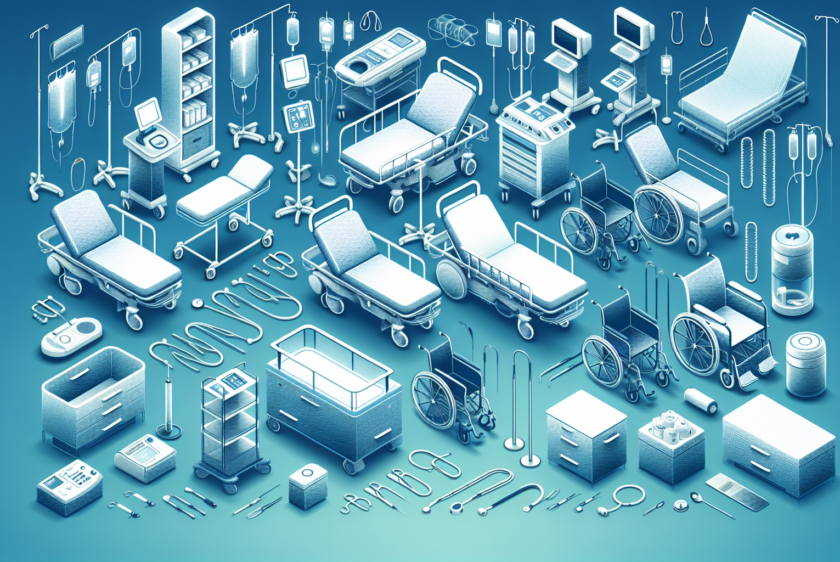The Importance of Quality Hospital Equipment
Quality hospital equipment plays a pivotal role in providing optimal patient care and ensuring the smooth operation of healthcare facilities. Investing in reliable and high-quality equipment can significantly impact patient outcomes and the overall efficiency of medical institutions.
Impact of Quality Equipment on Patient Care
The use of quality hospital equipment directly influences the quality of care provided to patients. From diagnostics to treatment, durable and accurate equipment enhances the effectiveness of medical procedures, leading to better diagnosis and treatment outcomes. Reliable equipment not only promotes patient safety but also contributes to reducing the risk of errors and complications during medical interventions.
Healthcare professionals rely on state-of-the-art equipment to deliver timely and accurate care, improving the efficiency of medical services and enhancing patient experiences. Moreover, quality equipment helps in maintaining infection control standards, ensuring a safe and sterile environment for patients.
Factors to Consider When Choosing Hospital Equipment Suppliers
Selecting the right hospital equipment suppliers is a critical decision that healthcare facilities must make to ensure the procurement of top-notch equipment. Several factors should be taken into account when evaluating potential suppliers:
| Factors to Consider When Choosing Suppliers |
|---|
| Quality Standards and Certifications |
| Range of Products and Services |
| Customer Reviews and Testimonials |
Quality Standards and Certifications: Look for suppliers that adhere to stringent quality standards and possess relevant certifications that guarantee the reliability and safety of their products. Compliance with regulations and industry standards should be a priority when selecting equipment suppliers.
Range of Products and Services: Assess the variety and depth of products and services offered by potential suppliers. A comprehensive range of equipment options allows healthcare facilities to select products that best meet their needs, ensuring the availability of cutting-edge technologies and solutions.
Customer Reviews and Testimonials: Prioritize suppliers with positive feedback from existing customers. Evaluating customer reviews and testimonials can provide valuable insights into the supplier’s reputation, reliability, and customer service. A supplier with a track record of exceptional service and customer satisfaction is more likely to meet the expectations of healthcare institutions.
By focusing on these key factors when choosing hospital equipment suppliers, healthcare facilities can establish successful partnerships that contribute to the delivery of high-quality care and the continuous improvement of healthcare services. The selection of reliable suppliers is fundamental in maintaining operational efficiency, promoting patient well-being, and enhancing overall healthcare standards in medical facilities.
Leading Hospital Equipment Suppliers
In the realm of hospital equipment suppliers, it is vital for government agencies and contractors to identify reliable partners that can provide high-quality equipment to support patient care. Here, we introduce three leading hospital equipment suppliers: Supplier A, Supplier B, and Supplier C, each offering a distinct range of products and services to cater to the needs of medical facilities.
Supplier A: Overview and Services
Supplier A is renowned for its comprehensive range of hospital equipment, including hospital bedside tables, medical fixtures, and other essential furniture items. With a strong focus on quality and durability, Supplier A prides itself on delivering products that meet stringent industry standards.
Their services extend beyond product delivery, encompassing installation, maintenance, and after-sales support to ensure the smooth operation of hospital equipment. Government agencies and contractors can rely on Supplier A for tailor-made solutions that align with the specific requirements of healthcare facilities.
Supplier B: Overview and Services
Supplier B stands out in the market for its innovative approach to hospital equipment supply. Specializing in cutting-edge medical fixtures and furnishings, Supplier B offers a diverse portfolio of products designed to enhance patient comfort and caregiver efficiency.
From state-of-the-art hospital beds to advanced monitoring systems, Supplier B is committed to providing advanced technological solutions that elevate the standard of care in healthcare settings. Their dedication to research and development ensures that clients have access to the latest advancements in hospital equipment.
Supplier C: Overview and Services
Supplier C is a trusted partner for government agencies and contractors seeking reliable hospital equipment solutions. With a focus on sustainability and cost-effectiveness, Supplier C offers a range of products that prioritize efficiency without compromising on quality.
Their services encompass personalized consultations, project management support, and customized equipment solutions to meet the unique needs of each healthcare facility. Supplier C’s commitment to customer satisfaction has earned them a reputation for reliability and excellence in the industry.
By partnering with these leading hospital equipment suppliers, government agencies and contractors can procure top-tier products and services that elevate the standard of care in medical facilities. Evaluating the offerings of Supplier A, Supplier B, and Supplier C allows stakeholders to make informed decisions that align with the needs and objectives of their healthcare projects.
Evaluating Hospital Equipment Suppliers
To ensure that hospitals have access to top-notch equipment and supplies, evaluating hospital equipment suppliers is a critical step. Here are key factors to consider when assessing potential suppliers:
Quality Standards and Certifications
When evaluating hospital equipment suppliers, it is essential to prioritize quality standards and certifications. Look for suppliers that adhere to industry-specific regulations and standards. Certifications such as ISO 9001:2015 for quality management systems and ISO 13485 for medical devices are indicators of a supplier’s commitment to quality. By choosing suppliers with these certifications, hospitals can trust that the equipment meets stringent quality requirements.
Range of Products and Services
A diverse range of products and services is another crucial aspect to consider when evaluating hospital equipment suppliers. Suppliers that offer a wide selection of equipment, from hospital bedside tables to specialized medical fixtures, provide hospitals with the flexibility to meet their varied needs. Additionally, suppliers that offer complementary services such as installation, maintenance, and repair ensure a comprehensive support system for hospitals.
To illustrate the importance of product range, below is a comparison table showcasing the range of products offered by three hypothetical hospital equipment suppliers:
| Supplier | Range of Products |
|---|---|
| Supplier A | Hospital beds, medical carts, examination tables, surgical lights |
| Supplier B | Patient lifts, stretchers, medical recliners, IV poles, anesthesia machines |
| Supplier C | Operating room furniture, imaging equipment, sterilization systems, diagnostic tools |
Customer Reviews and Testimonials
Customer reviews and testimonials provide valuable insights into the reputation and reliability of hospital equipment suppliers. Before making a decision, it is advisable to research and read feedback from other healthcare facilities that have utilized the services of the prospective suppliers. Positive reviews that highlight timely deliveries, product reliability, and responsive customer support can instill confidence in the chosen supplier.
By considering these key factors – quality standards and certifications, product range and services, as well as customer reviews and testimonials – hospitals can make informed decisions when selecting equipment suppliers. Ensuring that these suppliers align with the hospital’s goals and requirements will lead to a successful partnership that benefits both healthcare providers and patients.
Making the Right Choice
When it comes to selecting hospital equipment suppliers, a meticulous evaluation process is essential to ensure that the needs of the hospital are met efficiently. This section focuses on the crucial steps involved in making the right choice: assessing your hospital’s needs, requesting quotes and proposals, and negotiating terms and contracts.
Assessing Your Hospital’s Needs
Before engaging with hospital equipment suppliers, it is imperative to conduct a thorough assessment of your hospital’s requirements. Consider factors such as the type of medical procedures conducted, patient demographics, and the existing equipment inventory. By identifying specific needs and priorities, you can streamline the selection process and focus on suppliers that offer solutions tailored to your hospital’s unique demands.
| Category | Assessment Criteria |
|---|---|
| Medical Specialties | Cardiology, Orthopedics, Pediatrics, etc. |
| Patient Volume | Inpatient beds, Outpatient services |
| Technological Requirements | Imaging equipment, Diagnostic tools |
| Budget Constraints | Capital expenditure, Operational costs |
Requesting Quotes and Proposals
Once you have a clear understanding of your hospital’s needs, the next step is to request quotes and proposals from potential equipment suppliers. Reach out to multiple suppliers to gather comprehensive pricing information and detailed proposals outlining the products and services they offer. Compare the quotes based on factors such as cost, product quality, warranty terms, and after-sales support to make an informed decision.
| Supplier | Quoted Price | Product Range | Warranty Terms | Customer Support |
|---|---|---|---|---|
| Supplier A | $XXX | Wide Range | 2-year Warranty | 24/7 Assistance |
| Supplier B | $XXX | Specialized Products | 3-year Warranty | On-site Service |
| Supplier C | $XXX | Basic Range | 1-year Warranty | Phone Support Only |
Negotiating Terms and Contracts
Lastly, negotiating favorable terms and contracts with the chosen hospital equipment supplier is a critical aspect of the procurement process. Engage in discussions regarding pricing, payment schedules, delivery timelines, training and installation services, and maintenance agreements. Ensure that all terms are clearly defined in the contract to avoid any misunderstandings in the future. Effective negotiation can result in mutually beneficial agreements that meet the hospital’s needs while establishing a long-term partnership with the supplier.
By following a systematic approach that involves assessing needs, requesting quotes, and negotiating terms, your hospital can make a well-informed decision when selecting equipment suppliers. Remember that quality care begins with quality equipment, and choosing the right suppliers is a pivotal step towards enhancing patient outcomes and operational efficiency.







